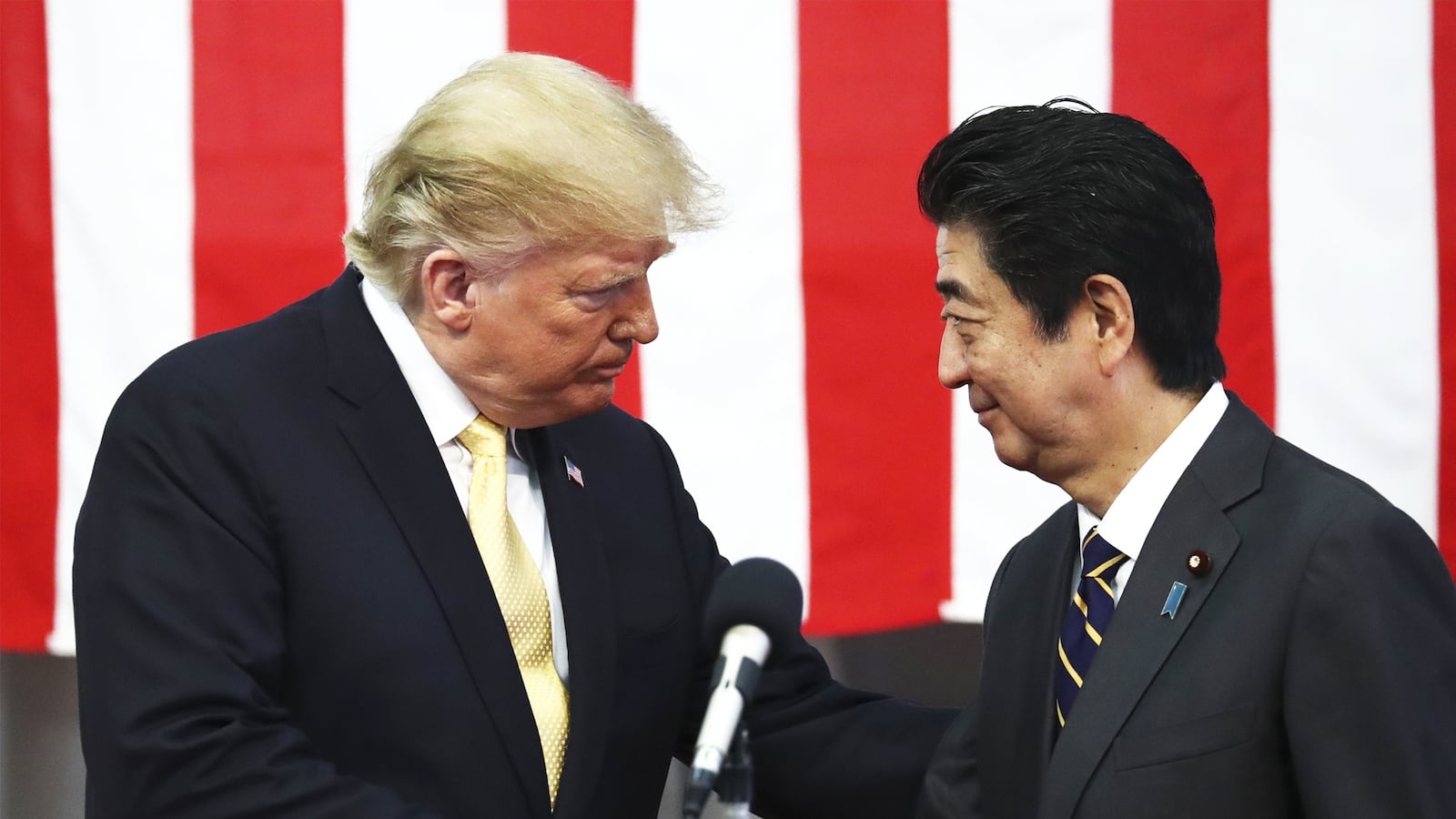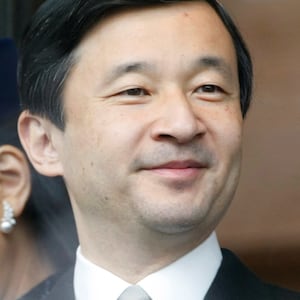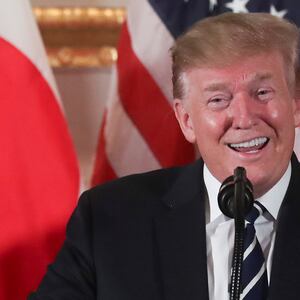Japanese Prime Minister Shinzo Abe “was Trump before Trump,” Steven Bannon once said, and he probably was right. That may be why the bromance between these two leaders has seemed to survive, while President Donald Trump’s other bromances have all burned out faster than an engagement to Ariana Grande. French President Emmanuel Macron was practically jilted.
But it is often a one-sided relationship between Shinzo and Donald, with Donald leaving Shinzo in the dust, or the sand-trap, if you will. Trump is the master and Abe is the clever lap-dog, but capable of human speech. Still, Abe’s apple-polishing, lavish gift-giving (gold-plated golf clubs, etc.), and kissing Trump’s Sumo-sized ass seem to have helped Japan avoid a trade-war with the U.S. for the moment.
Now that Trump has wrapped up his visit after a largely ceremonial sojourn, if Abe pursues his ambitions to be a peace broker between Iran and the U.S., little Shinzo may find that he is on a very short leash.
The reasons for Abe’s sudden desire to in become our man in Japan… and Tehran, we will get to in a moment.
Abe and Trump have a lot in common. Both were born wealthy but not smart, and were elected not by the popular vote but indirectly. They have managed to hold onto power after a never ending series of corruption and cronyism scandals. They both flirt with racism and nationalism to please their base, and hate the free press, and attack it regularly—including individual reporters, all the while cozying up to favorable conservative outlets.
Trump has had Fox News and conservative media. Abe has The Yomiuri Shimbun and public broadcaster NHK a.k.a. Abe TV. Abe reportedly told Trump in one of their earliest meetings, “I hope you tame the New York Times the way I tamed the Asahi Shimbun [Japan’s liberal newspaper].”
Who knows, maybe Trump was listening to Abe’s advice when he started his “fake news” screed? In any event, from Abe’s first rushed visit to pay his respects to Trump at Trump Tower before the inauguration, the two have been on pretty friendly terms.
The president and First Lady Melania Trump arrived in Tokyo on Saturday for a state visit. They were treated to an imperial banquet and attended a sumo match. Trump presented a sumo wrestler with the first ever President’s Cup, a gigantic trophy as gaudy as a Trump Casino. He was greeted with great applause after his speech, especially when touching upon the name of the new imperial era, Reiwa.
Trump was the first foreign dignitary to meet the newly ascended Emperor Naruhito, at a lavish ceremonial dinner held in the president’s honor on Monday evening. Trump and Abe played golf, even posting a picture of themselves smiling together on Twitter.
(Tuesday’s talks were disrupted briefly by a horrific murder in the city of Kawasaki where a deranged man with a knife attacked a group of school-children, killing one parent and one child. Abe addressed the issue—and went back to business with Trump.)
Behind the festivities and banquets, there were two main issues on the agenda for this visit: the U.S./Japan trade deficit and North Korea. Trump had dinner with U.S. business leaders at the U.S. Embassy on the day of his arrival and reiterated his views that reaching a new bilateral trade agreement to fix the U.S.-Japan trade imbalance was essential. Trump leaked to Fox News, that he would postpone any real talks about trade until after Japan’s next elections in July. It seemed to be a nod of support to Abe and his Liberal Democratic Party.
Japan’s opposition party leaders criticized Abe’s handling of Trump, claiming that it looked like the American was taking a vacation. But a Ministry of Foreign Affairs official emphasized the importance of this visit, noting, “We need to show off how strong our alliance is when considering our relationship to neighboring countries such as China, North and South Korea, and Russia.”
Trump scored some points for Abe on the North Korean issue by meeting with the families of Japanese abductees, and pledging to pressure North Korea to resolve the issue. Beginning in the 1970s, an unknown number of Japanese citizens were kidnapped by the North Koreans, right off Japan’s beaches, to train spies for North Korea. Only a few of them have been returned to Japan and the fate of the others remains unknown. Their fate is a point of contention between the two nations that has kept Japan away from the negotiating table.
Only recently has Abe softened his stance on the issue, and stated he would agree to meeting the North Korean leader without preconditions.
Abe has changed directions because within Japan, and to some extent outside of Japan, he is being criticized for achieving absolutely nothing in terms of foreign diplomacy. The respected newspaper Tokyo Shimbun, on May 22, ran a long penetrating feature on “Abe Diplomacy” under the title, “Blocked On All Sides” chronicling the failures of Abe to achieve anything on an international front, including talks with Russia over the Northern Territories that ended up a dead end.
Perhaps consciousness of failure to score in international diplomacy is why the Abe cabinet leaked to the Japanese press last Friday—the day before Trump arrived—that Abe was considering a visit to Iran as early as mid-June.
It would be the first such trip in over 40 years and comes amid rising tensions between Iran and the United States. Japan was a major buyer of Iranian oil for decades, and was granted a waiver to continue importing even after Trump pulled out of the 2015 nuclear deal with Tehran and started tightening sanctions. It stockpiled oil before the waiver expired, and Japanese Economy Minister Hiroshige Seko said last month that at this point Iran only accounts for about 3 percent of Japan’s purchases. But it’s probably worth noting most Japanese do not believe any of the Abe government’s economic statistics.
NHK “scooped” the plans for an Iran visit by Abe a week after Iranian Foreign Minister Mohammad Javad Zarif visited Japan. But officially? Abe has no such plans, cabinet spokesman Yoshihide Suga told the press. Unofficially, every single media outlet in Japan had the same report on the plans for Abe’s Iranian adventure.
There is a possibility that Abe may not get Trump’s approval and yet still proceed as planned. This would be a terrible mistake. He seems to have no clue how much the Trump administration is obsessed with Iran or how much influence John “The Walrus” Bolton has over Trump.
You can say many terrible things about Japan’s Prime Minister Abe but he has a sense of loyalty (especially to his cronies) and he values reciprocity. What Abe doesn’t get is that Trump has neither of these virtues. And if the lap dog goes yipping away on his own trying to make peace with the Iranian squirrels in the Global Peace Park, he will find Trump yanking his leash so hard he won’t be able to bark. In the end, the only tricks the American likes are "beg" and "roll over."
Makoto Iwahashi contributed to this report.








